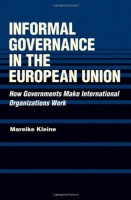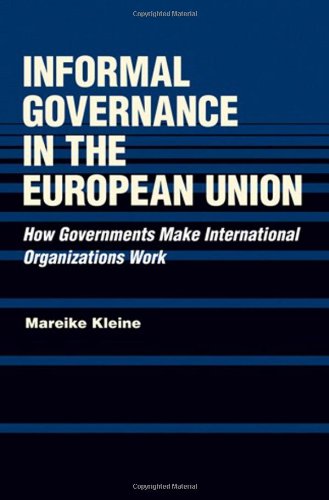 Author: Mareike Kleine
Author: Mareike Kleine
Publisher: Cornell University Press – 214 pages
Book Review by: Paiso Jamakar
Most observers of the European Union (EU) assume that this organization functions successfully for all members and their needs – economic, political and others – by adhering strictly to its formal rules that:
- Require strict obligations to be met, and
- Delegate substantial power to supranational actors such as the European Commission
But Mareike Kleine tells, and shows us, that this legalistic view is misleading. She asserts that more often than not, governments that belong to the EU and the bureaucrats informally depart from the formal rules and thereby contradict the very purpose of those rules.
She writes: “behind EU’s front of formal rules lies a thick network of informal government practices.” She points out that there is a high level of economic integration among EU members, and she shares her discoveries with us as to why this is so and how it has come about.
For example:
- EU members share a common currency: the Euro. There is no need to exchange currencies for travel within the EU.
- It is also not difficult to get around Europe with the Eurail pass.
- Citizens of EU member states are allowed to pass freely, unlike before when they had to show passports issued in their respective countries.
- There are other forms of integration that people in Europe or those who travel there can tell you about.
Kleine answers these questions and others in the book:
- What accounts for the high level of economic integration?
- How does the EU really work?
She says that informal governance enables governments to be flexible in resolving conflicts among themselves that formal rules may create or generate. She shows in this book in many ways how informal governance works.
She has gathered and tabulated data from national and European archives and provides in this book the first systematic analysis of the parallel development of the formal rules and the informal norms that have governed the EU from the 1958 Treaty of Rome until today. In this book, she presents the following sections, with their particular focus:
Introduction
- Liberal Regime Theory
- Formal and Informal Governance in the European Union
- The Commission’s Agenda-Setting Power
- Decision Making in the Council and the Parliament
- The Implementation of EU Policies
- Knowing the Limits
- The Council Presidency as an Adjudicator
- Adjudicatory Authority in Practice
Conclusion and Extension
The December 2009 Treaty of Lisbon (EU Treaty) established the European Union. It replaced the October 2004 treaty that had established a Constitution of Europe that was signed by 25 member states of the European Union
Kleine says that the number of ways and the instances in which EU members outright avoided or at least bent the formal rules is endless. Here are just two instances:
- The EU Treaty prohibited member states from financially bailing out any state that had excessive debt. But the member states agreed outside of the formal rules to bail them out, as happened in several instances.
- The European Central Bank (ECB) purchased sovereign debt instruments of several member states in the secondary market to help them through their financial dilemmas, even though its formal written mandate prohibited it from doing so.
There are many situations in which member states want to work informally and discreetly with other member states in order to solve their financial problems, particularly very high government debt levels caused by deficit spending way above and their tax revenues. In order not be embarrassed publicly, they prefer do things through what Kleine terms “informal governance.”
Randall W. Stone of the University of Rochester puts it very succinctly in the back cover of this book as to why it is valuable. He writes: ”Mareike Kleine moves beyond the formalistic analysis of institutional rules to investigate the politics behind the scenes, and she convincingly demonstrates that informal governance is a key ingredient that makes European integration possible.”
This is a unique book, and Mareike Kleine, who has done extensive and intensive research into how things really get done among EU member states, has opened up new vistas of knowledge for members of the academia, the mass media, and the general public. Our congratulations to her for her pioneering work.
Maeike Kleine is University Lecturer in EU Politics at the London School of Economics.







